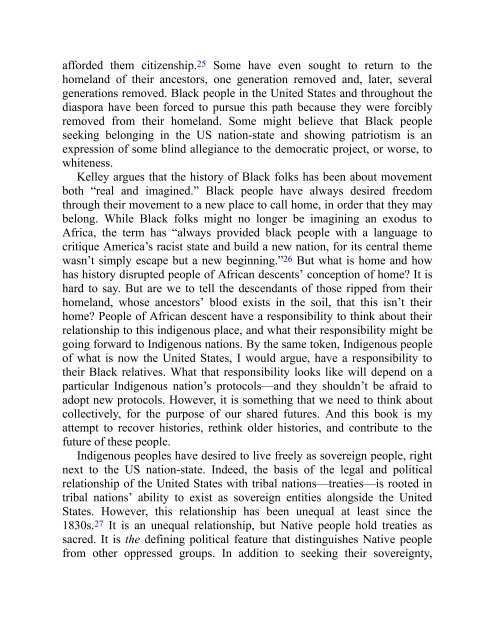Create successful ePaper yourself
Turn your PDF publications into a flip-book with our unique Google optimized e-Paper software.
afforded <strong>the</strong>m citizenship. 25 Some have even sought to return to <strong>the</strong><br />
homeland <strong>of</strong> <strong>the</strong>ir ancestors, one generation removed and, later, several<br />
generations removed. Black people in <strong>the</strong> <strong>United</strong> <strong>States</strong> and throughout <strong>the</strong><br />
diaspora have been forced to pursue this path because <strong>the</strong>y were forcibly<br />
removed from <strong>the</strong>ir homeland. Some might believe that Black people<br />
seeking belonging in <strong>the</strong> US nation-state and showing patriotism is an<br />
expression <strong>of</strong> some blind allegiance to <strong>the</strong> democratic project, or worse, to<br />
whiteness.<br />
Kelley argues that <strong>the</strong> history <strong>of</strong> Black folks has been about movement<br />
both “real and imagined.” Black people have always desired freedom<br />
through <strong>the</strong>ir movement to a new place to call home, in order that <strong>the</strong>y may<br />
belong. While Black folks might no longer be imagining an exodus to<br />
Africa, <strong>the</strong> term has “always provided black people with a language to<br />
critique America’s racist state and build a new nation, for its central <strong>the</strong>me<br />
wasn’t simply escape but a new beginning.” 26 But what is home and how<br />
has history disrupted people <strong>of</strong> African descents’ conception <strong>of</strong> home? It is<br />
hard to say. But are we to tell <strong>the</strong> descendants <strong>of</strong> those ripped from <strong>the</strong>ir<br />
homeland, whose ancestors’ blood exists in <strong>the</strong> soil, that this isn’t <strong>the</strong>ir<br />
home? People <strong>of</strong> African descent have a responsibility to think about <strong>the</strong>ir<br />
relationship to this indigenous place, and what <strong>the</strong>ir responsibility might be<br />
going forward to <strong>Indigenous</strong> nations. By <strong>the</strong> same token, <strong>Indigenous</strong> people<br />
<strong>of</strong> what is now <strong>the</strong> <strong>United</strong> <strong>States</strong>, I would argue, have a responsibility to<br />
<strong>the</strong>ir Black relatives. What that responsibility looks like will depend on a<br />
particular <strong>Indigenous</strong> nation’s protocols—and <strong>the</strong>y shouldn’t be afraid to<br />
adopt new protocols. However, it is something that we need to think about<br />
collectively, for <strong>the</strong> purpose <strong>of</strong> our shared futures. <strong>An</strong>d this book is my<br />
attempt to recover histories, rethink older histories, and contribute to <strong>the</strong><br />
future <strong>of</strong> <strong>the</strong>se people.<br />
<strong>Indigenous</strong> peoples have desired to live freely as sovereign people, right<br />
next to <strong>the</strong> US nation-state. Indeed, <strong>the</strong> basis <strong>of</strong> <strong>the</strong> legal and political<br />
relationship <strong>of</strong> <strong>the</strong> <strong>United</strong> <strong>States</strong> with tribal nations—treaties—is rooted in<br />
tribal nations’ ability to exist as sovereign entities alongside <strong>the</strong> <strong>United</strong><br />
<strong>States</strong>. However, this relationship has been unequal at least since <strong>the</strong><br />
1830s. 27 It is an unequal relationship, but Native people hold treaties as<br />
sacred. It is <strong>the</strong> defining political feature that distinguishes Native people<br />
from o<strong>the</strong>r oppressed groups. In addition to seeking <strong>the</strong>ir sovereignty,


















